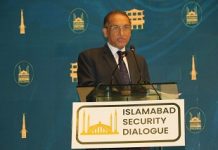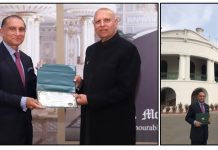Roundtable on “Role of Pakistani Diaspora”
April 23, 2019
Migration has been a phenomenon as old as the human history. Conflict, fear of persecution, search for greener pastures, or simply quest of knowledge has led groups of people to migrate to distant lands and then adopt them as their homeland. Much of what man has achieved is owed in large measure to the cross pollination of knowledge, commerce, customs, and cultural interactions. Our Holy Prophet PBUH migrated from Mecca to Medina and then never left his adopted city.
As the world became more inter-connected, and faster means of communications became more readily available, migration became a norm rather than an exception.
Migrants tend to maintain their cultural identity in the adopted homeland. Thus, for a generation or two or sometimes for several generations, the migrants serve as a bridge between the motherland and their adopted homeland.
For many nations, this link has served to enable them make a leap forward in development of their societies. For instance, Chinese Diaspora, which is possibly the most numerous diaspora for any nation, became the major source of much needed foreign exchange when Deng Xiaping decided to put his country on the path of modern development. Likewise, Indian Diaspora has been the flag bearer of Indian values and customs the world over. In the US, Indian diaspora is playing an important role in bringing India and the US closer.
Pakistanis too have travelled far and wide, mostly in search of economic opportunities, and sometimes for fear of political, sectarian or ethnic persecution. Today, they can be found in every major country, with strong concentrations in Saudi Arabia, UK, UAE, US, other Gulf countries and central and western Europe. These Pakistanis are deeply attached to their motherland and have repeatedly shown that want to serve their country in whatever manner they can. For its part, the successive governments of Pakistan have also evolved mechanisms to capitalize on this sentiment and provide opportunities to the Diaspora to serve their motherland.
Traditionally, there are three ways by which overseas Pakistanis serve their motherland.
- send much needed remittances.
- invest in or trade with their motherland.
- promote the positive image of their heritage.
However, to capitalize fully on this important resource, it is imperative to fully understand the profile of our Diaspora and then devise strategies geared to each category of overseas Pakistanis.
Numbers:
The exact figure of Pakistani Diaspora is not known. The estimates suggest that there could be 7 to 10 million overseas Pakistanis. Of this over 2 million Pakistanis live in Saudi Arabia, 1.5 million in UK, 1.2 million in UAE, one million in the US, one million or more in other Arab Gulf States, and around half a million in other European countries.
Significance:
Pakistani Diaspora is a national asset for Pakistan. They are citizen ambassadors of Pakistan as Pakistan is identified with their conduct. Besides sending much needed remittances for our economy, many affluent members of the Diaspora are also trading with or investing in Pakistan.
Composition:
The make-up of Pakistani Diaspora is diverse and as varied as in the country. They are also as divided as we are in the country, along political, ethnic, social, and sectarian lines. To understand the profile of our Diaspora, some academic literature is available in ‘Portrait of a Giving Community: Philanthropy by the Pakistani-American Diaspora’ by Adil Najam (Harvard University Press, 2007) and from ‘How Immigrants Impact their Capitalizing on Pakistan’s Diaspora.
Different categories of Pakistani Diaspora include low income workers, affluent Pakistanis, investors and entrepreneurs, students, and second generation Pakistanis.
Capitalizing the Diaspora:
Since the composition of the Pakistani Diaspora is diverse, there cannot be one strategy that would address the needs and concerns of our Diaspora. To capitalize on this national resource, different strategies would be required for each category to capitalize on their strengths for the good of our country.
The first category is Low-income workers, perhaps the largest segment, employed mostly in manual labor (construction), services (cab drivers, petrol station attendants, shopkeepers), or small business. They are the source of bulk of remittances to Pakistan. They are likely to return and resettle in Pakistan. They are mostly preoccupied by economic survival, legal issues, and thus need higher consular services, ease of money transfers, travel to Pakistan facilities, saving schemes in Pakistan.
The second category is Affluent expatriates, like high-paying professionals (physicians, engineers, bankers, business executives) and successful businessmen and entrepreneurs. They do not invest huge in Pakistan but are high in philanthropy. Total philanthropy in Pakistan by Pakistanis abroad is significant, though it can decline due to current restraints on financial transfers. This group can have high social influence, but not necessarily proportionate political influence. They are often self-made and tend to be very demanding as investors and philanthropists. Usually distrusting of government, but eager to contribute expertise. Besides philanthropy, they can be a source of upscale tourism to Pakistan.
The third category is Students. Highly interested in Pakistan. They carry social influence on their non-Pakistani peers, professors and institutions. Most of them are likely to have to return to Pakistan. They have high interest in remaining ‘in touch’ with Pakistan, projecting Pakistan positively to their peers, and creating and serving social and cultural organizations related to Pakistan. Considerable scope in nurturing and recognizing their leadership role in a host of social and cultural activities.
The fourth category is second generation Pakistani individuals of Pakistani origins born outside of Pakistan. This is a growing category and rising to positions of policy. Their concerns are much different from the first generation as they grew up in non-Pakistani settings. They can have high influence on public perception and political opinion in their host country. Highly interest in information that instills pride in Pakistani heritage, and promising source of heritage tourism in Pakistan.
The fifth category is Investors & Entrepreneurs. This is a relatively small group of Pakistanis who have the capacity to make large-scale investments or set up enterprises in Pakistan. Many of them are corporate executives and can influence FDI decisions by their companies in Pakistan. Direct capital investments and corporate FDI investments are the most obvious contributions of these groups.
Steps that the Government of Pakistan can take to capitalize on the Diaspora.
Areas requiring priority attention of the government:
Efficient consular services. Overseas Pakistanis in the Gulf are there mainly for economic opportunities. They do not get the local nationality and are highly dependent on our embassies for consular and other services. It is important that our consular sections are spacious, comfortable and efficient in providing services. The weather in the Gulf is harsh. It is not fair to oblige them to wait in long queues in hot sultry halls. They must feel at home when they come to our embassy. Apart from facilities, our consular staff must develop an attitude of service to them.
Legal aid: Many of our low income diaspora in the Gulf, Europe and America, face difficulties in regard to their immigration status. Sometimes they end up in jails. Legal help to them could alleviate their misery. Our government can evolve ways to render legal service to them, especially those stuck for want of minor crimes.
Theft of properties and other investments in Pakistan. One major problem that nearly all overseas Pakistanis face is with regard to the difficulties they face in Pakistan, especially when their properties. The OPF and Ministry of Overseas Pakistanis is simply helpless.
Philanthropy:
Investment opportunities. Many of our overseas Pakistanis invest in real estate. However, through some effort, we could incentivize them to invest in the industrial sector of Pakistan. For this special windows of service would need to be created.












